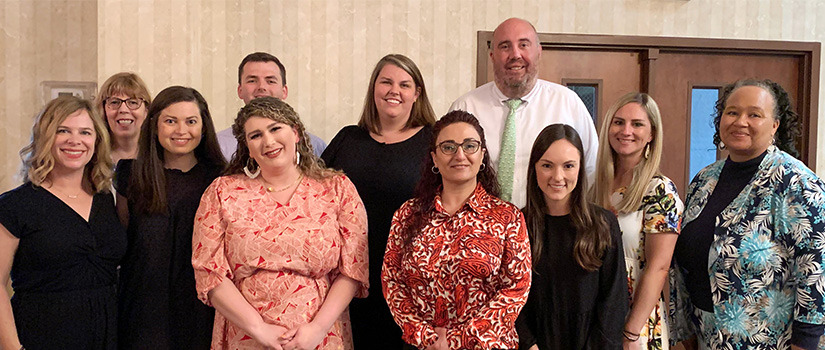Alumni answer the call to guide future pharmacists
Pharmacists have a great deal of responsibility in meeting the day-to-day demands of their positions – whether as a community pharmacist, health-system pharmacist or any one of the numerous roles pharmacists fulfill. Many of them also take on the added responsibility of training student pharmacists, a role that requires additional focus and dedication to ensure students gain as much knowledge and experience as possible before embarking on their own careers.
For Jennifer Baker, ‘02, director of experiential education for the University of South Carolina College of Pharmacy, many of these volunteer preceptors go above and beyond what is required for both introductory pharmacy practice experiences, which follow the first and second years of the professional program, and advanced pharmacy practice experiences for fourth-year students.
“Preceptors have to make sure the students know how they are performing throughout the entire month of their rotation,” Baker says. “They hold the students accountable for their responsibilities and their professionalism, providing guidance to help them grow.”
I want to ensure that students are constantly growing and that I am providing them opportunities to learn.
Jenna Cox, Pharm.D. Prisma Health Richland Hospital
Jenna Cox, ‘12, believes the entire trajectory of her career changed during her advanced pharmacy practice experiences. “I thought I wanted to pursue a retail setting,” she says, “but rotations opened my perspective to clinical pharmacy.”
Now, as the director of the Post-Graduate Year 2 Critical Care Residency Program at Prisma Health Richland Hospital, Cox is paying it forward by serving as a preceptor to students.
“Looking back on my preceptors and how they helped shape and influence me, isn’t it great to be able to give back?” says Cox. “I want to ensure that students are constantly growing and that I am providing them opportunities to learn.”
Baker applauds Cox’s dedication to training students.
“She even reached out to me to coordinate additional acute care rotations to help students in preparing for the NAPLEX, the national pharmacy licensure exam. She wants to help them be successful forever,” Baker says.
Valerie Kennedy-Robinson, ‘88, managed care pharmacist with Prisma Health Richland Hospital, was precepting students before she officially became a preceptor.
“Growing up, I wanted to be a teacher,” she says. “I had a great manager when I first started working at Richland, and I would help her with her students. She encouraged me to consider being a preceptor.”
Kennedy-Robinson was recently named a preceptor of the year by the Palmetto Experiential Education Partnership, a partnership between the College of Pharmacy and the Medical University of South Carolina College of Pharmacy experiential education programs.
In nominating Kennedy-Robinson for the award, one of her students noted that she shows compassion, not only for her patients, but for everyone around her.
“She goes above and beyond every day to help patients get prior authorizations so they can fill their medications,” the student wrote.
Kennedy-Robinson is grateful to be named as a top preceptor.
“It makes me feel that what I am doing each day is making a difference,” she says. “It means a great deal to me that I can impact someone else.”
I appreciate all the things the university as a whole did for me ... This is my way to contribute and help young aspiring pharmacists.
Steven Frazier, Pharm.D. Prisma Health Children's Hospital
Steven Frazier, ‘06, also a PEEP award winner this year, is pharmacy supervisor for Prisma Health Children’s Hospital. He became a preceptor as a way to give back to the College of Pharmacy.
“I appreciate all the things the university as a whole did for me,” he says. “This is my way to contribute and help young aspiring pharmacists.”
Frazier says that to be a good preceptor, it is important to listen to your students.
“Being a preceptor is another way to stay connected to see what the students are learning,” he says. “I meet with them on day one to find out what they want to get out of my rotation, so that I can set them up to learn as much as possible.”
Elizabeth Rodriguez, ‘19, is a pharmacist with Greenwood Regional Rehabilitation Hospital in Greenwood, South Carolina. She also is a 2022 PEEP award recipient.
“I hear from my students that they want to feel more confident, so I work to help build their confidence in their pharmacy knowledge and in their role as a pharmacist,” she says. “I want to provide more experience for them and reinforce with them their responsibilities to their patients. I knew that when I graduated and stepped into my role as a pharmacist, it was important to the field of pharmacy and to my students to contribute to their learning.”
Baker feels indebted to these preceptors and all those who work diligently to immerse their students into their practice sites.
“They make the students feel that they are a part of the team and are contributing to the mission and goals of that organization and that area of care, giving them the best rotation experience possible.”
Topics: Experiential Learning, Pharm.D. Program, Become a Preceptor
